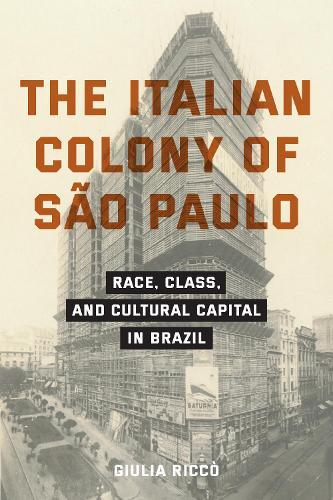Awards
- Winner of Aldo and Jeanne Scaglione Publication Award for a Manuscript in Italian Literary Studies 2024
Overview
Winner, 2024 Aldo and Jeanne Scaglione Publication Award for a Manuscript in Italian Literary Studies, Modern Languages Association Introduces a way to study migration that privileges literary analysis over and against sociological data and insists on the importance of culture in the production of political identities This book argues that Italians first became racialized as white in São Paulo, Brazil, at the turn of the twentieth century. Whereas Italians in the United States struggled with xenophobia and were often not fully acknowledged as white, in São Paulo, due to a series of social, economic, and cultural factors, Italians became closely associated with ideas of whiteness, modernization, and civilization. This book brings to light how the overlooked experiences of Italians in Brazil complicate conventional narratives about the racial ambiguity and oppression of Italians in the Americas, on the one hand, and the conflation of Italians with cultural and economic backwardness in Europe, on the other. In the book, close readings of a wide array of texts—the travel writings of Gina Lombroso Ferrero, the short stories of Antônio de Alcântara Machado, the columns of José Correia Leite, the political essays of Miguel Reale, and the memoirs of Zélia Gattai—trace a ""New World Italian discourse,"" or the overlapping narratives about Italian racial, economic, and cultural superiority which constructed and maintained Italians' status as a model minority in São Paulo. These discursive practices represent essential antecedents to the racial nationalism that reared its ugly head in Italy throughout the twentieth century and remain central to contemporary debates about national identity in the Italian public sphere. The Italian Colony of São Paulo: Race, Class, and Cultural Capital in Brazil is available from the publisher on an open-access basis.
Full Product Details
Author: Giulia Riccò
Publisher: Fordham University Press
Imprint: Fordham University Press
Edition: New edition
ISBN: 9781531512248
ISBN 10: 1531512240
Pages: 240
Publication Date: 02 September 2025
Audience:
Professional and scholarly
,
Professional & Vocational
Format: Hardback
Publisher's Status: Active
Availability: Not yet available

This item is yet to be released. You can pre-order this item and we will dispatch it to you upon its release.
Reviews
The Italian Colony of São Paulo offers illuminating perspectives on the Italian presence in Brazil, on the wider history of Italian migration, and on what that history can tell us about racial politics in a variety of locations, including Italy and the United States. With originality and analytical depth, the author delivers a powerful critique of ethnicity and its politics, significantly enriching and repositioning the growing body of work on Italians in the Americas.---Loredana Polezzi, Stony Brook University The Italian Colony of São Paolo is a groundbreaking study of Italian immigration to Brazil and the formation of Italian ethnic identity within a multiracial society marked by a large Black population and a legacy of plantation slavery. Giulia Riccò draws on a rich array of voices--including elite Italian travelers, literary modernists, working-class Black Brazilians living alongside Italians, middle-class Italo-Brazilians with fascist leanings, and labor-oriented working-class Italo-Brazilians. She shows that Italians in Brazil succeeded in positioning themselves as exemplars of Mediterranean whiteness, in contrast to Italians in the United States, who often faced stigmatization due to their imagined closeness to Blackness.---Christopher Dunn, Tulane University, author of Contracultura: Alternative Arts and Social Transformation in Authoritarian Brazil
Author Information
Giulia Riccò is an assistant professor of Italian at the University of Michigan, Ann Arbor.



